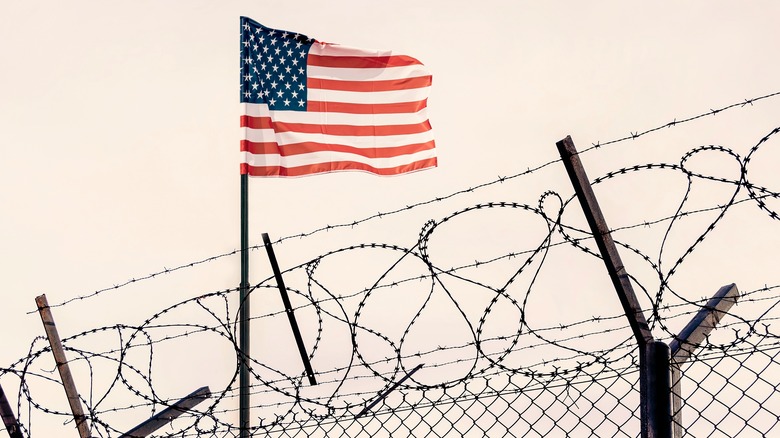A Russian Professor's Prediction Of What A Split America Would Look Like
It's not a shocking, dramatic statement to say that the United States is somewhat of a divided country. Or at least, it's a country with multiple identities and visions of itself depending on where you go. Driving from New York City to New Orleans, for instance, is like traveling not only to a different country, but passing through a few other countries along the way. Or consider New Orleans to Chattanooga, Chattanooga to Lincoln, Lincoln to San Diego: each step reveals a nation separated by prevailing cultures and even fundamental ideologies. Insider and others have gone so far as to draw up maps illustrating how the United States is more of a whole bunch of mini-nations rolled into one. Whether those nations are "united" is another issue entirely.
At the risk of sounding the conspiracy alarm, the United States' somewhat troubled sense of self hasn't gone unnoticed around the world. Back in 1984, ex-KGB agent Yuri Alexandrovich Bezmenov described how Soviet intelligence targets the U.S.' inherent divisions. Big Think quotes him describing the KGB strategy of "demoralization" and "brainwashing." The goal was "to change the perception of reality of every American to such an extent that despite the abundance of information no one is able to come to sensible conclusions in the interest of defending themselves, their families, their community, and their country." More recently in 2009, Russian academic Igor Panarin in The Wall Street Journal predicted that the United States would actually balkanize, or split into a bunch smaller, separate countries.
6 small, separate republics
Granted, Igor Panarin's predictions about U.S. balkanization are 12 years overdue, as he predicted the U.S. would fracture in 2010, as the Wall Street Journal cites. That being said, the U.S. hasn't exactly grown more cohesive since then. The death knell of the U.S. rings and rings incessantly nowadays, even obsessively, as though it's what its own citizens actually want. But trust us: It wouldn't be a good time, whether the country's balkanization looks like Panarin's version or something else entirely.
On that point, Panarin's vision of the Divided States of America splits the country into six different nations. There's Atlantic America centered on the country's oldest part, New England (no shock there), and extending down to Kentucky and Tennessee (a bit odd), which Panarin said might seek to join the European Union (a reasonable assumption). Then there's The Central North-American Union that extends from Ohio to Colorado and up to the Canadian border, which Panarin said would fall under Canadian influence. The Californian Republic encompasses Washington down to Arizona and falls under Chinese influence. The Texas (not Texan, apparently) Republic spreads from New Mexico to Florida and falls under Mexican influence. Hawaii goes to Japan (not likely; they're a staunch ally) or China, and Alaska goes back to the ones who sold it to the U.S.: Russia (because of course). So really, Panarin's vision of a balkanized United States is more like four regional continental groups. Anything away from the mainland gets lost.
Shifting dividing lines
Right off the bat, there's something far too neat about Panarin's predictions, which read more like a KGB wish list for disposing of the Soviet Union's most preeminent, mid-20th-century Cold War foe. Each piece of the U.S. falls squarely under the influence of a foreign power facing its nearest continental cardinal direction? Not likely. Panarin's predictions sound like one of those disinformation campaigns described by ex-KGB agent Yuri Alexandrovich Bezmenov on Big Think meant to sow paranoia amongst the American populace. Besides, it might fit to place Alabama with Georgia, but a pairing like West Virginia and Massachusetts? That makes zero sense, even with only cursory knowledge of the U.S.
That being said, other maps like those on Insider make more sense, with regions like The Midlands, Greater Appalachia, and New France. And as we mentioned, discussions of the eventual demise and partitioning of the American union continue to persist and foment. On the subreddit r/collapse, for instance, everyday folks debate and toss ideas around about U.S. balkanization. Many users point to this or that region being far better off economically than others, or certain regions being more prone to extremism and thereby being a danger to neighbors. But unlike the actual eastern European Balkans – places like Albania, Macedonia, Serbia, Bulgaria, etc. — that fractured due to things like Soviet influence, the U.S. is a much more tightly bound blend of ethnic groups, even considering regional factionalism. Any and all predictions regarding U.S. balkanization fall flat.


